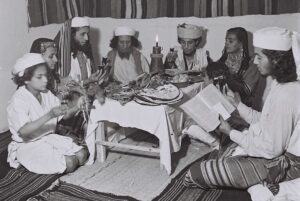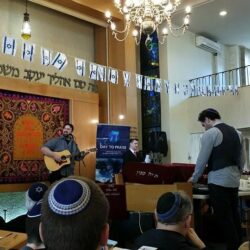Rav Saadia Gaon lists three additions to the Seder Pesaḥ which he considers not necessary, but acceptable. This is the third, a poetic insert of the blessing of redemption known as Ata Ga’alta. In the form of an alphabetical acrostic, this poem is still recited in many eastern communities including the Babylonians, Persians, and Yemenites, and was a feature of the the old Kaifeng rite. Here it is recorded and translated into English according to the nusaḥ of Saadia Gaon, with notes in several locations for additional phrases used in some customs.
Note: “The CAUSE” is used to translate the Divine Name YHVH, based on the philosophical idea of God as the Prime Mover and on the interpretation of the Name as a causative form of the copula – “causes to be.”
[If you’d like to commission a Jewish creative work, check out my website at igmjewishcreativeworks.com!]
| Source (Hebrew) | Translation (English) |
|---|---|
בָּרוּךְ אַתָּה יהוה אֱלֹהֵֽינוּ מֶֽלֶךְ הָעוֹלָם אֲשֶׁר גְּאָלָֽנוּ וְגָאַל אֶת־אֲבוֹתֵֽינוּ מִמִּצְרַֽיִם וְהִגִּיעָֽנוּ לַלַּֽיְלָה הַזֶּה לֶאֱכׇל־בּוֹ מַצָּה וּמְרוֹרִים׃ |
Blessed are You, CAUSE our God, Sovereign of Eternity, who redeemed us and redeemed our ancestors from Egypt and brought us to this night to eat upon it matsah and bitter herbs. |
אַ֯תָּה גָאַלְתָּ אֶת־אֲבוֹתֵֽינוּ מִמִּצְרַיִם בְּיָד חֲזָקָה וּבִזְרֹֽעַ נְטוּיָה בִּ֯הְיוֹת אֲבוֹתֵֽינוּ בְּתוֹךְ אֶֽרֶץ מִצְרַֽיִם הָיוּ מְעֻנִּים וּמְשֻׁעְבָּדִים תַּֽחַת יַד פַּרְעֹה מֶֽלֶךְ מִצְרַֽיִם גַּ֯ם שָׁם פָּרוּ וְרָבוּ כַּעֲפַר הָאָֽרֶץ וּכְאַרְזֵי הַלְּבָנוֹן גָּבְהוּ בְקוֹמָה |
You redeemed our ancestors from Egypt, with a strong hand and an outstretched arm. Our ancestors were within the land of Egypt, suffering and laboring under Pharaoh king of Egypt’s hand. But they were fruitful and multiplied like earth’s dust, and grew in stature like the Lebanon cedars. |
דִּ֯בֶּר פַּרְעֹה הָרָשָׁע לִמְחוֹת אֶת־שְׁמָם וּלְהַאֲבִיד אֶת־זִכְרָם מִקֶּֽרֶב תֵּבֵל ה֯וּא וְעַמּוֹ בְעֵצָה אַחַת הָיוּ וַיִתְחַכְּמוּ סוֹד עַל־זֶרַע יִשְׂרָאֵל וַ֯יְמָרְרוּ אֶת־חַיֵּיהֶם בְּפָֽרֶךְ וּבְתַשְׁנִיק גָּדוֹל קָצְרָה רוּחָם |
Evil Pharaoh said to wipe out their name, and destroy their reputation from upon the earth. He and his people plotted as one, and secretly schemed against the seed of Israel. And embittered their lives with corvée, and with great choking cut short their breath. |
זֶֽ֯רַע יְשֻׁרוּן אֲנָחָה לָבַשׁ כִּי יַד אוֹיֵב גָּבְרָה עֲלֵיהֶם חַ֯י וְקַיָּם שָׁמַע קוֹלָם מֶֽלֶך מַלְכֵי הַמְּלָכִים[1] יש מוסיפין הַקָּדוֹשׁ בָּרוּךְ הוּא או בָּרוּךְ הוּא הֶאֱזִין לָהֶם ט֯וֹב וְיָשָׁר גָּדַּל מֵהֶם מֹשֶׁה יְדִיד בֶּחָזוֹן הֻשְׁלַח לָהֶם |
The seed of Yeshurun wore groaning, for the hand of the enemy was high over them. The Living and Enduring heard their voice, the Sovereign, Sovereign of sovereigns[2] Some add “The blessed Holy One” or “The Blessed One” gave ear to them. A good and upright one THEY[3] This translation uses the pluralis majestatis to refer to the Divine. This is not meant to imply that God is more than one ḥas v’shalom but rather to reflect the vastness and majesty of God while also avoiding gendered language. See Ibn Ezra’s commentary on Genesis 1:1 for a discussion of the pluralis majestatis when referring to God. raised from them beloved Moses in a vision was sent to them. |
יַ֯חַד הֶרְאָם אוֹתוֹת שַׁדַּי וּבְמִינֵי נְגָעִים נִשְׁפְּטוּ בְנֵי־חָם כׇּ֯ל־בְּכוֹרֵֽיהֶם לַטֶּֽבַח מָסָר רֵאשִׁית בִּטְנָם לְדֶֽבֶר גָּדוֹל לָ֯כֵן נָפְלָה צְעָקָה גְּדוֹלָה בְּתוֹךְ אֶֽרֶץ מִצְרַֽיִם בְּכִי וּמִסְפֵּד בְּכׇל־חוּצוֹתֶֽיהָ |
Together he showed them the signs of Shaddai, and with distinct plagues the Ḥamites were judged. All their firstborns were given to the slaughter, the first of their wombs to a great disease. Thus a great cry fell within the land of Egypt, weeping and mourning in all her courtyards. |
מֵ֯עַבְדוּת לְחֵרוּת יָצְאוּ יְדִידִים וְאֵין כּוֹשׁל בְּמִסְפַּר שְׁבָטָיו נָ֯הֲגָם בְּטוּבוֹ צוּר עוֹלָמִים וַיַּגִּיעֵם לְיַם־סוּף בְּרַחֲמִים רַבִּים סָ֯גַר הַיָּם עֲלֵיהֶם בַּהֲמוֹן גַּלָּיו שׂוֹנֵא רוֹדֵף בַּהֲמוֹן חֵילוֹ |
From slavery to freedom the beloved ones went out, and none failed from the ranks of their tribes. The Rock of Eternities led them in THEIR goodness, and brought them to the Reed Sea in great compassion. The sea closed them in with its vast waves, the bigot pursued with his vast force. |
עֵ֯ינֵיהֶם נָשְׂאוּ לַמָּרוֹם לְבַקֵּשׁ רַחֲמִים מֵאֲבִיר יַעֲקֹב פִּֽ֯יהֶם פָּתְחוּ גְאוּלֵי יהוה וְשִׁבְּחוּ לְמַלְכָּם עַל־רֹב נִפְלְאוֹתָיו |
They raised their eyes to the Heights, to beg for compassion from Jacob’s Might. The redeemed of the CAUSE opened their mouths, and praised their Sovereign for THEIR many wonders. |
צָ֯הַל רוֹכְבוֹ בְּאוֹיְבֵי עַמּוֹ לְהַשְׁלִיךְ שׂוֹנְאָיו אֶל־תּוֹךְ מְצוּלָה קָ֯רַע יהוה אֶת־מֵי יַם־סוּף וְקִיֵּם אֶת־הַשְּׁבוּעָה אֲשֶׁר נִשְׁבַּע לַאֲבוֹתֵֽינוּ רָ֯אוּ יְדִידִים בְּפִגְרֵי שׂוֹנְאֵיהֶם שֶׁהֵם מֻטָּלִים עַל־שְׂפַת הַיָּם |
The mounts of the people’s enemies neighed to throw the bigots into the depths. The CAUSE split the waters of the Reed Sea and fulfilled THEIR oath that THEY swore to our ancestors. The beloved ones saw the bigots’ corpses, for they were lain out on the shore of the sea. |
שִׁ֯ירָה וְזִמְרָה וְדִבְרֵי הַלֵּל אָמַר מֹשֶׁה[4] יש מוסיפין רַבֵּנוּ או רַבֵּנוּ עָלָיו הַשָּׁלוֹם לִפְנֵי קוֹנוֹ תְּ֯הִלָּה וְתִפְאֶֽרֶת וְדִבְרֵי תִשְׁבָּחוֹת אָמְרוּ פְדוּיִים לִפְנֵי גוֹאֲלָם וּמוֹשִׁיעָם |
Song and hymn and words of praise said Moses[5] Some add “our master, peace be upon him” or “our master.” before his Maker. Praises and glory and words of laudation said the liberated before their Redeemer and Rescuer. |
כֵּן יְהוה אֱלֹהֵֽינוּ וֵאלֹהֵי אֲבוֹתֵֽינוּ יַגִּיעֵֽנוּ לְמוֹעֲדִים וְלִרְגָלִים אֲחֵרִים הַבָּאִים לִקְרָאתֵֽנוּ לְשָׁלוֹם שְׂמֵחִים בְּבִנְיַן עִירָךְ וְשָׂשִׂים בַּעֲבוֹדָתָךְ׃ וְנֹאכַל שָׁם מִן־הַזְּבָחִים וּמִן־הַפְּסָחִים שֶׁיַּגִּיעַ דָּמָם עַל־קִיר מִזְבַּחָךְ לְרָצוֹן וְנוֹדֶה לָךְ שִׁיר חָדָש עַל־גְּאֻלָּתֵֽנוּ וְעַל־פְּדוּת נַפְשֵֽׁנוּ׃ בָּרוּךְ אַתָּה יהוה גָּאַל יִשְׂרָאֵל׃ |
Thus, CAUSE our God and God of our ancestors, bring us to other festivals and pilgrimages to come to greet us in peace, rejoicing in the building of Your city and celebrating in Your labor. And we will eat there of the sacrifices and paschal offerings from which their blood is brought onto Your altar wall as desired, and we will thank You with a new song for our redemption and the liberation of our souls. Blessed are You, CAUSE, who redeemed Israel. |
Musical Notation
Notes
| 1 | יש מוסיפין הַקָּדוֹשׁ בָּרוּךְ הוּא או בָּרוּךְ הוּא |
|---|---|
| 2 | Some add “The blessed Holy One” or “The Blessed One” |
| 3 | This translation uses the pluralis majestatis to refer to the Divine. This is not meant to imply that God is more than one ḥas v’shalom but rather to reflect the vastness and majesty of God while also avoiding gendered language. See Ibn Ezra’s commentary on Genesis 1:1 for a discussion of the pluralis majestatis when referring to God. |
| 4 | יש מוסיפין רַבֵּנוּ או רַבֵּנוּ עָלָיו הַשָּׁלוֹם |
| 5 | Some add “our master, peace be upon him” or “our master.” |

“אתה גאלת | Atah Ga’alta (You Redeemed Our Ancestors), a Poetic Rendition of the Blessing of Redemption in the Pesaḥ Seder (ca. 9th c.)” is shared through the Open Siddur Project with a Creative Commons Attribution-ShareAlike 4.0 International copyleft license.











Leave a Reply